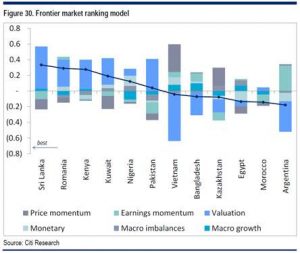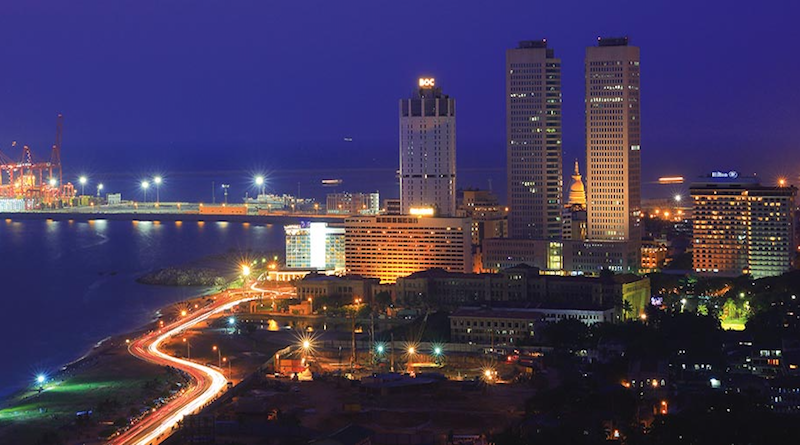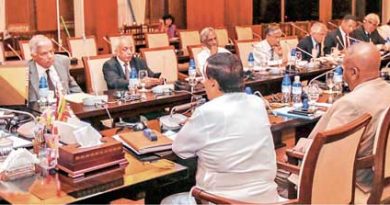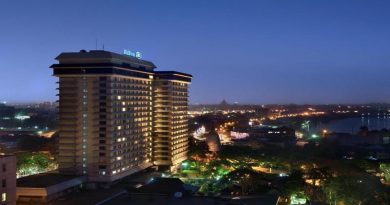Sri Lanka,most attractive frontier market on WSJ – Research
This Week on the Frontiers, January 27th 2018
By Dan Keeler
Frontier markets are in prime position to pioneer the use of blockchain technologies and to lead in the use and development of cryptocurrencies, according to frontier-focused investment bank Exotix. “We may be at the beginning of another episode of technology leapfrogging as frontier economies move straight to blockchain distributed ledgers and cryptocurrencies as alternatives for weak domestic institutions and capital controls,” Paul Domjan, Exotix’s global head of research, said.
In an interview with WSJ Frontiers, Domjan argued that blockchains, which underlie cryptocurrencies such as Bitcoin and Ether, could be invaluable in recording contracts, enabling transactions and establishing ownership in countries where institutions are weak. The cryptocurrencies themselves are already proving popular in countries such as Zimbabwe and Venezuela where faith in the conventional currency is low.
Exotix made its prediction in a report on the key themes that could provide new opportunities for investors in frontier markets. Among the other themes it identified were China’s changing engagement with frontier markets from a predominantly extractive relationship to one based more on partnership, and the impact of mobile money—particularly the evolution of e-commerce businesses built around mobile money services.
Another key theme developing in frontier markets investing is increased transparency, according to Andrew Howell, frontier markets strategist at Citi. Recent improvements in published data and in analyst coverage has made it possible to measure earnings and share-price momentum, which are key elements in an accurate valuation model, Howell said.
“More analysts’ forecasts are available, companies themselves have just got better at communicating what’s going on, and investor relations functions have expanded quite dramatically,” Howell told the WSJ. The downside? “Portfolio managers might find it harder to get an information edge.”
Citi has used the data to build a rating model for the leading frontier markets, which gives investors a macro view of prospects for 12 countries. The model currently shows Sri Lanka, Romania and Kenya as the most attractive markets based on six key metrics: earnings momentum, price momentum, valuation, macro growth and imbalances and monetary policy. “We thought Sri Lanka was cheap, but it turns out it’s really cheap,” Howell noted. “It’s a market you probably want to look at closely.”
 Zimbabwe’s new president this week pledged to respect the results of national elections due this year—even if his ZANU-PF party loses, Gabriele Steinhauser reports. “If we lose elections that’s it,” Emmerson Mnangagwa told the World Economic Forum in Davos, Switzerland. “Whatever party wins will proceed to take the reins of power.”
Zimbabwe’s new president this week pledged to respect the results of national elections due this year—even if his ZANU-PF party loses, Gabriele Steinhauser reports. “If we lose elections that’s it,” Emmerson Mnangagwa told the World Economic Forum in Davos, Switzerland. “Whatever party wins will proceed to take the reins of power.”
The 75-year-old, who took over after longtime leader Robert Mugabe was ousted by Zimbabwe’s military in November, said national elections will take place “earlier than July” and would be free and fair. “This time around, Zimbabwe is open and transparent. We want to have free, fair and credible elections, free of violence,” he said, adding that election observers from the European Union would be allowed to monitor the vote.
Since taking power, Mnangagwa has worked to re-engage his cash-strapped country with the international community. Zimbabwe has been under sanctions from Western governments for violently expelling white farmers in the late 1990s and early 2000s. “Zimbabwe is open for business,” he said.
Also in Davos, Nigeria’s Vice President Yemi Osinbajo said Africa will replace China as the factory of the world, Pietro Lombardi reports. This shift will quickly generate more employment, he said, but he also cautioned that no African economy would grow quickly enough to meet the needs of the continent’s booming population. What Africa needs, Osinbajo said, is a real partnership with Europe, more investment and policies centered on job creation.
JPMorgan Chase is planning to expand into Ghana and other African nations, chief executive Jamie Dimon said at WEF, Emily Glazer reports. “You’ll see us open in some countries we are not in, in Africa you’ll be hearing about some of that stuff,” Dimon said.
JPMorgan attempted expansions into Africa earlier this decade. Around 2012, it was reported that the bank would spread into Ghana, Nigeria and Kenya, but those plans were blocked by US banking regulators. In 2015, bank executives continued to examine a possible African expansion, but regulations continued to limit those plans.
Uzbekistan is continuing its efforts to deepen its engagement with the global community, Lukas I. Alpert reports. Since Uzbekistan’s new president, Shavkat Mirziyoyev, assumed power a year ago following the death of longtime authoritarian leader, Islam Karimov, Uzbekistan has moved to improve relations with its neighbors after years of tensions. Among the changes has been the reopening of border crossings, reestablishment of direct flights between Tashkent and its neighbors’ capitals and a commitment for more cross-border trade.
This week, the country announced it is stepping up its involvement in finding a peaceful solution to decades of war in neighboring Afghanistan, saying that an end to fighting there is key to counterterrorism efforts across the entire region. In late March, Uzbekistan will host a conference in Tashkent involving regional powers as well as representatives from the US, Russia, China and elsewhere to try to establish how to bring the Afghan government, the Taliban and other warring parties into direct peace talks.
Tensions are rising in the birthplace of the Arab Spring as increasing numbers of young Tunisians are again taking to the streets, protesting rising prices and a new government budget that increased taxes on basic goods, Jared Malsin and Hassan Morajea report. The protests reflect deep public frustration over the country’s economic woes, and activists say at least some people were compelled to take part after hearing about the suicide of an unemployed repairman.
The 2011 uprising sparked the Arab Spring and resulted in broader freedom of expression and democratic elections in Tunisia. But the revolution hasn’t produced prosperity or dismantled the police state set up under former President Zine El Abidine Ben Ali, who was ousted in the rebellion.
The Saudi-led coalition fighting Houthi rebels in Yemen said it plans to provide $1.5 billion of new relief funding for the war-torn country and will open new routes for vital imports, Asa Fitch reports. Riyadh and its allies face increasing international pressure over the conflict’s toll on civilians. The aid package comes as the fight between the US-backed coalition and Yemen’s Houthi rebels produces escalating hardship in a country that was already the Arab world’s poorest before the conflict started in 2015. The United Nations says thousands have been killed, and millions are on the brink of starvation.
The new aid move appeared to address growing pushback from aid agencies and rights groups, who accuse the coalition of stalling commercial traffic through Houthi-controlled ports and perpetuating a humanitarian crisis through its military operations.
Libya’s National Oil Company says oil production has restarted at the 50,000-barrels-a-day Al-Salah oil fields after a blockade of over two months, Benoit Faucon reports. Pumping had been blocked since early November, costing the Libyan economy $281 million, state-run NOC said. It said the unauthorized shutdown was carried out by Wintershall, but a representative for the German company says the local community of Jakhira had demanded that Wintershall shut production at the fields. Wintershall turned off the spigots to ensure the security of its employees and security, the spokesperson said.
Georgia’s Prime Minister Giorgi Kvirikashvili this week defended his country’s desire to join NATO, asserting that territorial integrity should be the cornerstone of any efforts at conflict resolution in Eurasia, Nathan Allen reports. Speaking at WEF in Davos, Kvirikashvili said Georgia’s NATO aspirations are a sovereign concern and don’t represent a threat to Russia, while Russia’s occupation of Abkhazia and South Ossetia remains a “big problem.” Nevertheless, he said, the two countries have many areas of common interest, particularly in trade and tourism.
Venezuela’s plan to go ahead with snap presidential elections without guarantees that they’ll be free and fair will lead to tougher US sanctions that would most probably affect the oil sector, Kejal Vyas writes. According to consultancy IHS Markit, more-severe measures could include further restrictions on state energy giant PdVSA’s conducting transactions in US dollars as well as a ban on US exports of special crude-processing components that Venezuela needs for the functioning of its oil industry.
Venezuela’s oil output is already in fast-decline after years of underinvestment. Increased political tensions combined with Venezuela’s economic collapse raise concerns over whether the government will be able to pay the billions of dollars it owes on bond bond payments due in the first half of this year.
The IMF this week said it expects Venezuela’s economy to shrink around 15% this year and for inflation to rise to about 13,000%.
(Pulse)




